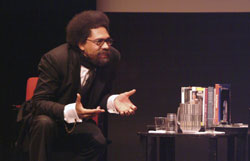The Matrix of the Possible: A Conversation with Cornel West
The Matrix, to Cornel West, is about learning to hold yourself accountable. Princeton scholar and actor in the Wachowski brothers Matrix film trilogy, Cornel West came to share his insights about film, race and society with Teachers College.
On Friday evening, March 26th, West wowed a packed house at Columbia's Miller Theater during a program entitled "Film & Education: The Matrix of the Possible."
The evening was sponsored by the Film & Education Research Academy (FERA) at the Center for Educational Outreach and Innovation at Teachers College, and featured West in dialogue with TC doctoral student Kelvin Sealey.
West's conversation with Sealey touched on many topics, but West began by talking about education. At its essence, West feels education needs one critical element. He summed it up with one Greek word: paideia, or, as he describes it, critical consciousness-one of the most important things that educators can instill in their students and themselves.
In addition to talking about paideia and the idea he attributes to Brazilian educator Paolo Freire of "conscientiousization" of students, West lodged his always insightful views on a range of topics, from his exit from Harvard and the cultural importance of music in every form, to how we as a society have to choose how to respond to terrorism.
Several film clips were presented throughout the discussion, including scenes from Network, Dr. Strangelove and Bulworth. After their one-on-one discussion, Sealey and West fielded questions from those in attendance.
West and the audience were also very interested in discussing The Passion, which West described as "Rambo on the cross." He also discussed the much debated idea of cultural responsibility in the context of that film and criticism levied against it for being anti-Semitic. West, though he had not seen the film, viewed it as having failed to recognize the responsibility of the imperial elite, in this case the Roman Empire, for the death of Jesus. The metaphor, he argued, applies to modern society, especially in America, where there is scant acknowledgment of the influence our own imperial elite has over society.
Audience members were eager to hear from West, not only about film and education, but issues such as affirmative action, Christian theology, same-sex marriage, and the role of the U.S. military in Haiti and the war in Iraq.
FERA is a research, publishing and teaching project within CEO&I. Sealey, a doctoral candidate in Interdisciplinary Studies, co-founded the academy with John Broughton, Associate Professor of Psychology and Education. Its mission is to explore the interplay between cinema, teaching and learning. The event embodied that mission, providing a vibrant forum for the TC Community to engage in a conversation about important and timely issues with a well-regarded scholar.
Published Sunday, Sep. 12, 2004
